[ad_1]
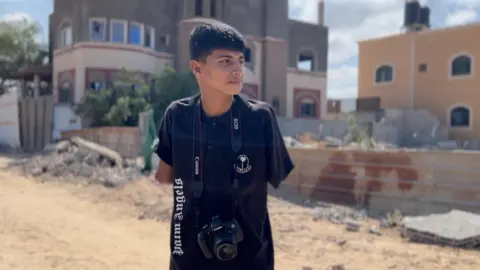 BBC
BBCStanding between two bars erected at a mobile clinic in Rafah, southern Gaza, Rizeq Tafish concentrates as he takes his first tentative steps in four months.
“My feelings before were sadness and despair. Now I feel happiness and freedom,” he says, grinning afterwards.
Rizeq is one of the first of thousands of wounded Palestinians who should receive new prosthetic limbs from Jordanian doctors using state-of-the-art British technology.
Warning: This report contains graphic details of injuries
Displaced to Rafah, he was wounded by Israeli tank fire as he left Friday prayers in June. With his leg amputated, the blacksmith could no longer work and was feeling desperate.
“I lost my whole life: my job and my hope,” Rizeq says. “There was no one to take care of my wife and baby. I even needed help to use the toilet.”
The human cost of Israel’s destructive year-long war in Gaza is measured not just in lives lost but in lives changed forever.
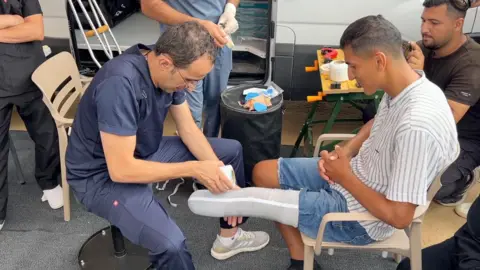
After analysing emergency medical data, the UN’s World Health Organization (WHO) estimates that at least 94,000 people are injured. More than 24,000 people – one in every 100 Gazans – has a life-changing injury. These include serious burns, trauma to the head and spine and limb amputations.
At the same time, it has become virtually impossible to leave Gaza for medical treatment and only 16 out of 36 hospitals are functional. Rehabilitation services are heavily disrupted. The WHO says just 12% of equipment needed for injured people – such as wheelchairs and crutches – is available.
The Jordanian programme uses innovative prosthetics from two British firms, Koalaa and Amparo. They have easy-to-fit sockets and a new direct moulding technique for lower limbs, which avoid month of waiting and multiple fittings.
“This is a new type of prosthesis. Its main feature is fast manufacture. It means it will be ready for the patient within only one to two hours,” explains Jordanian army doctor, Lt Abdullah Hamada, who has deftly fitted Rizeq with his replacement leg.
His medical team has already helped dozens of amputees. Each prosthetic limb costs about $1,400 (£1,100), with funding from the Jordanian state and a national charity.
Every fitting is registered digitally allowing for remote monitoring and follow-up procedures.
If it is safe enough, the plan is for two Jordanian mobile units to move around. There is a huge need for prosthetics across all of Gaza among all age groups.
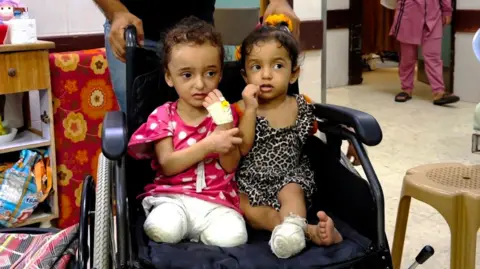
At the al-Aqsa Martyrs hospital in central Gaza, sisters Hanan and Misk al-Doubri are so small that they fit in one wheelchair. Last month, they lost their mother and their legs in an Israeli air strike on their home in Deir al-Balah.
Misk, who is 18 months old, had just learned to walk. Now she struggles to stand on her one good foot. But Hanan, who is three, has much more severe injuries; she was blasted out of her family’s first-floor apartment.
“We try to distract her, but she always returns to asking about her mum,” her aunt, Sheifa says. “Then she asks, ‘Where are my legs?’ I don’t know what to tell her.”
I asked the Israeli military why the al-Doubris were targeted but received no response.
Locals believe the girls’ father, a policeman, who remains in intensive care, may have been targeted. Israel has attacked many people who worked for the security forces in Hamas-governed Gaza.
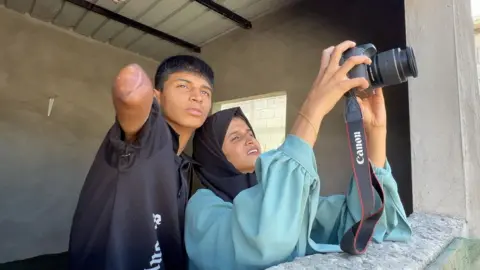
With Israeli drones overhead, 15-year-old Diya al-Adini surveys the destruction by his home in Deir al-Balah. Around his neck he always wears his prized possession, bought with months of savings: a digital camera.
However, he can no longer use it unaided: he has no arms.
In August, Diya was playing a computer game in a coffee shop when Israel bombed it.
“The speed of the rocket made it hard for me to react. After it hit, I lost consciousness for a few seconds,” Diya recalls. “When I came to, everything was white. It felt like I was watching a movie. I tried to get up, but I couldn’t move at all; I didn’t have any hands to help me.”
Diya used to love swimming and walking his dogs, he did errands on his bicycle and photographed landscapes. Now he relies on his older sister, Aya, to take photos for him. But he is determined to be positive.
“I am trying to plan a good future so that after I get prosthetics, I can work hard and excel to become a famous photographer,” he says. “I need my limbs to return to my photography, and to everything I loved.”
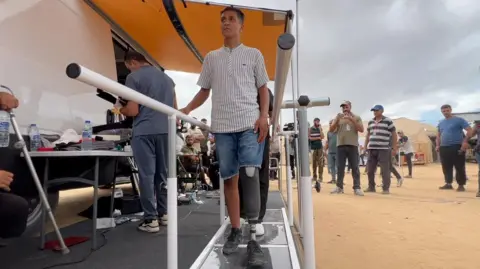
Making his way on the uneven path to the tent camp that he now calls home, Rizeq Tafish has been given crutches to help him adjust to his new prosthetic leg.
“I want to forget the period when I was without my legs and start again. I still consider myself to be whole and complete,” he tells a local journalist working for the BBC in Gaza.
“I could go back to my job or get a different one now that I have my new limb. Just getting my leg back is also giving me back my smile that I want to share with everyone.”
But there are tears of joy as well as smiles when he reaches his family. Rizeq’s mother is overcome as he walks forward without any help to embrace her and his wife praises God as he stands holding their little boy.
Rizeq is just one among many in Gaza learning to cope with a new serious disability but he has taken a step towards getting back his life.
[ad_2]

